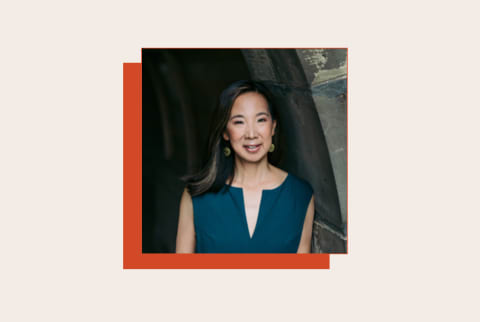Advertisement
3 Exercise Tips Women Absolutely Need To Know, From A Sports Journalist


The well-being space needs to do better for women. The lion's share of health and nutrition research is conducted on men, the biohacking space is brimming with bros, and even the exercise space can feel male-dominated.
Award-winning sports journalist Christine Yu, author of Up to Speed: The Groundbreaking Science of Women Athletes, is here to evolve the latter. While everyone's bodies are ultimately unique, women and men do have some fundamental differences that impact their exercise performance.
And yet most exercise advice takes a one-size-fits-all approach, often in favor of the male body. "Your body shouldn't be considered a limitation," she says on this episode of the mindbodygreen podcast. So here, Yu offers three exercise tips with women's anatomy in mind. (Note: These tips only scratch the surface of our conversation, so make sure to tune in to the episode for her nuanced deep dive.)
Focus on strength training
Say it with us: Strength training is one of the best exercises you can do for longevity. After all, strength training helps you build muscle mass, and muscle mass is a predictor of longevity and health span.
And yet, many women are still hesitant to hit the weight rack. This, says Yu, is likely a function of societal pressures to stay lean and avoid "bulking up." And the pressure starts young: "Girls aren't encouraged to go to the gym and lift," she notes, whereas coaches for boys' sports teams often encourage gym time. "What are we doing—or not doing—for girls to support them in learning how to use their bodies?"
According to Yu, we should encourage girls to strengthen their muscles from a young age so they can continue to reap the benefits as they grow older. Strength training can help build bones and help slow down bone loss as we age, and strong, durable muscle has even been dubbed the "organ of longevity."
See here to start some expert-approved strength training exercises today—and no, you won't accidentally "bulk up" overnight.
Eat enough fuel
"The most important thing is to make sure that you're eating enough," says Yu. "When you don't have enough fuel—not only to support daily activities of life but to support your exercise—you dig yourself into this hole in which you don't have enough energy."
And when your body lacks nutrients, it starts to shut down other systems to conserve that energy. "That's why the menstrual cycle can start to get wonky," she adds. "And that's why you can see potential impacts on gut health, cardiovascular health, [and] mental health1."
Aside from these overall health concerns, you'll also likely see deficits in performance—seems counterintuitive for someone wanting to enhance their exercise, right? "You're not going to adapt to your training, you're not going to recover well, you're not going to perform well," says Yu. "You just need to make sure you're getting enough food in your body to support what you're doing."
She doesn't encourage any one eating plan—just make sure you're eating enough. "Make sure you're eating consistently throughout the day, too," she adds. You don't want to dip into too much of an energy deficit at any one point of the day. A deficit of 300 calories can make a difference, and that's not a lot—that's a snack."
Know when to rest
As important as strength training is for longevity and overall exercise performance, it's just as crucial to let your body rest. "At my age, I do need to make sure I'm hitting the gym and strength training; I do need to make sure I'm hydrating and paying attention to my nutrition; [and] I do need to make sure that I'm resting and recovering because my body needs more of that time," Yu explains.
As much as you may want to power through a workout—especially once you finally start to notice gains—it's important to schedule in some recovery time. "If I do want to continue doing these things in the long term, I do have to be patient," Yu notes. After all, working your body past its limits often ends in injury, which often adds even more recovery time to your exercise schedule.
That said, make sure to nurture your muscles. Try stretching, foam rolling, acupuncture, or any of these muscle-recovering techniques.
The takeaway
We always say the best exercise is the one you'll do, but incorporating Yu's women-specific tips can enhance your regimen. Overall, just give yourself grace on your fitness journey. "Respect your body where it is," she says, and you can't go wrong.
We hope you enjoy this episode! And don't forget to subscribe to our podcast on iTunes, Google Podcasts, Spotify, Amazon Music, or YouTube!